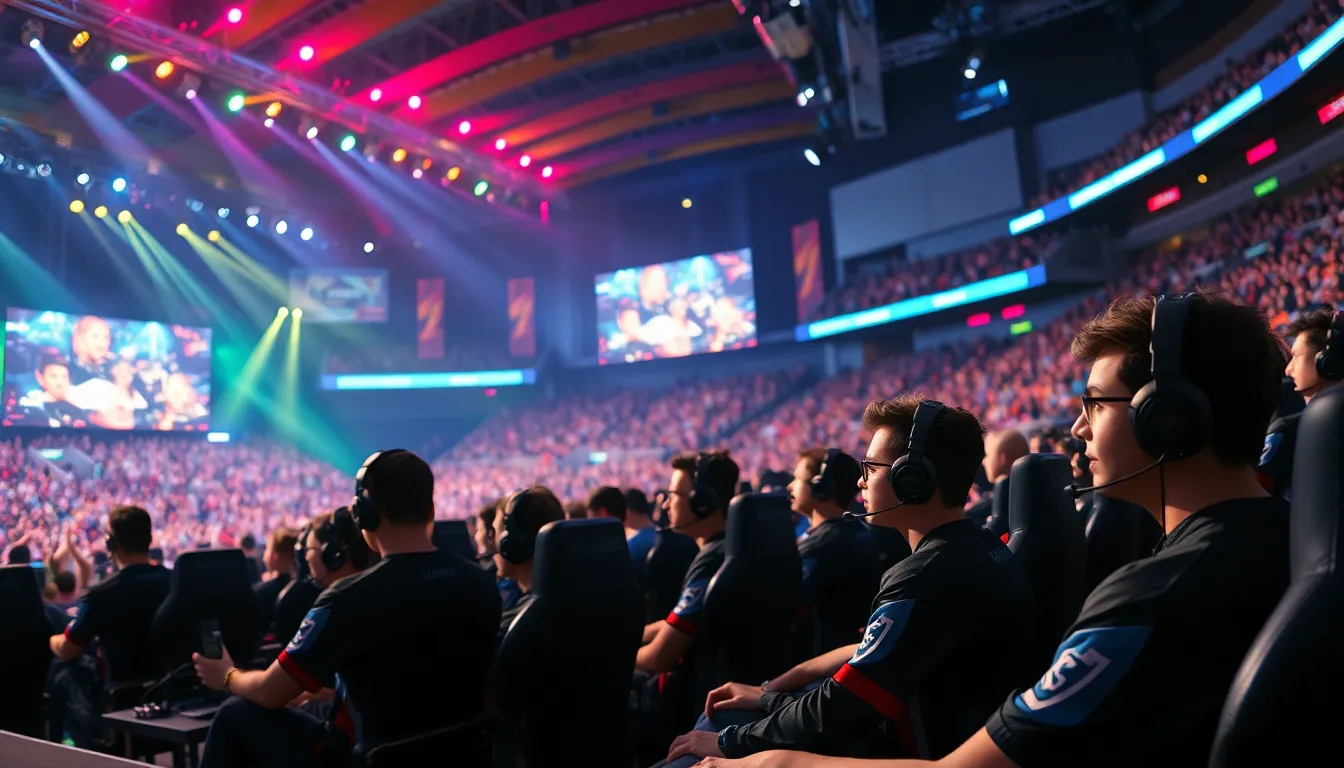Esports has exploded into a global phenomenon, captivating millions with its blend of strategy, skill, and sheer adrenaline. From the thrill of headshots in first-person shooters to the intense teamwork in multiplayer online battle arenas, the world of competitive gaming offers something for everyone. If you think gaming is just for kids, think again—these titles are raking in millions and turning players into household names faster than you can say “level up.”
Table of Contents
ToggleTop 10 Esports Games
- League of Legends: This game features multiplayer online battles with strategic mechanics that captivate millions worldwide. Over 100 million players engage with its dynamic gameplay annually.
- Dota 2: Known for its deep strategy and extensive hero roster, this game attracts professional tournaments with prize pools exceeding $40 million.
- Counter-Strike: Global Offensive: Often referred to as CS: GO, this first-person shooter emphasizes teamwork and skill. Its competitive scene generates millions in sponsorships each year.
- Fortnite: Blending battle royale mechanics with building strategies, this title has redefined competitive gaming. Events often offer significant cash prizes, making it a favorite among players.
- Call of Duty: Warzone: This game features robust multiplayer modes, appealing to both casual and competitive gamers. Regular updates keep the gameplay fresh for its dedicated audience.
- Overwatch: With its diverse cast of heroes and team-based gameplay, Overwatch fosters a strong sense of community. Its leagues and tournaments draw large viewership numbers.
- Valorant: This tactical shooter combines unique agent abilities with tight gunplay. Fast-growing esports leagues have emerged, showcasing high-level competitive play.
- PUBG: Battlegrounds revolutionized the battle royale genre by injecting realism and tactical depth. Players compete fiercely for survival on diverse maps.
- Rainbow Six Siege: Strategy takes center stage in this tactical shooter, where players engage in intense matches featuring destructible environments. The competitive scene thrives through regular updates and championship events.
- Apex Legends: Set in the Titanfall universe, this battle royale game emphasizes teamwork and unique character abilities. Its fast-paced matches keep players engaged.
These esports games exhibit significant popularity, skill, and excitement, drawing millions to their competitive arenas. Each game contributes to the evolving landscape of the esports industry, showcasing player talent and strategy on a global stage.
Overview of Esports

Esports represents a dynamic segment of the gaming world, captivating audiences globally through competitive play. It encompasses organized, multiplayer video game competitions, often featuring professional players and teams.
Definition of Esports
Esports refers to competitive gaming at a professional level. Players engage in tournaments across various game genres, including real-time strategy, first-person shooters, and battle royale. Spectators watch live events, many streamed online or held in large arenas. Professional players train rigorously to hone their skills, often participating in teams, much like traditional sports. Organizations sponsor these teams, providing financial support, training facilities, and coaching staff. With significant viewership and engagement, esports rivals traditional sports in popularity and revenue generation.
Growth of the Esports Industry
The esports industry has experienced exponential growth over the past decade. Revenue figures reached approximately $1 billion in 2021, propelled by sponsorships, advertising, and merchandise sales. Major companies invest in esports, creating leagues that mirror traditional sports structures. Platforms such as Twitch and YouTube Gaming provide spaces for streaming, enabling larger audiences to engage with live content. Significant events attract millions of viewers, and prize pools often total in the millions. As youth culture increasingly embraces competitive gaming, educational institutions also recognize the potential, leading to esports scholarships and programs. This increased interest signals a promising future for the industry and its athletes.
Criteria for Ranking
The ranking of esports games considers multiple essential factors.
Popularity Among Players
Popularity significantly influences game rankings. Player engagement and the number of active users serve as primary indicators. Games with millions of active players often demonstrate a vibrant community. For instance, League of Legends boasts over 100 million monthly players, highlighting its widespread appeal. Engagement on platforms such as Twitch amplifies this effect, as viewership numbers reflect player interest. A game’s presence across various regions enhances its ranking, showcasing global appeal. This factor remains essential when evaluating esports games.
Competitive Scene
The competitive scene plays a critical role in determining a game’s status. Major tournaments and leagues contribute to a game’s prestige. Games like Dota 2 provide substantial prize pools, attracting top-tier talent. The structure of competitions influences consistency, with organized events maintaining player and viewer interest. Regular updates and balance changes keep the competitive landscape evolving. A consistently engaging competitive scene fosters a dedicated player base. This aspect serves as a crucial criterion for ranking.
Community and Support
Community engagement and developer support significantly shape a game’s reputation. Active communities foster player interaction, collaboration, and growth. Games with strong support systems see healthier ecosystems. Examples include forums and social media channels, where players share strategies and insights. An ongoing commitment from developers to improve gameplay assures players of their investment. Game developers often prioritize community feedback, enhancing player retention. A robust community and support framework critically influences game rankings.
The Top 10 Esports Games
Esports games captivate millions worldwide, each bringing unique mechanics and strategic depth. Below are the top ten games that dominate the competitive gaming landscape.
Game 1: League of Legends
League of Legends, released in 2009, remains a leader in the esports realm. Players engage in strategic battles across diverse maps, boasting a blend of teamwork and individual skill. Annual tournaments, such as the World Championship, attract millions of viewers and feature substantial prize pools. The game’s large community continuously generates content and discussions, ensuring its place in the competitive scene.
Game 2: Dota 2
Dota 2 showcases intense, multiplayer online battles that challenge players’ strategies. Launched in 2013, it quickly gained a reputation for its complexity and depth. The International, Dota 2’s premier tournament, offers one of the highest prize pools in esports, attracting elite players from around the globe. Player collaboration is vital, as teams must coordinate effectively to seize victory.
Game 3: Counter-Strike: Global Offensive
Counter-Strike: Global Offensive, often abbreviated as CS:GO, focuses on team-based first-person shooter gameplay. In 2012, it revitalized the CS franchise with new mechanics and maps. The game’s competitive scene thrives through tournaments like ESL One and Major events, drawing significant player engagement. CS:GO consistently fosters community support, enabling players to hone their skills and tactics.
Game 4: Fortnite
Fortnite revolutionized the gaming space with its battle royale format and building mechanics since its release in 2017. Players compete individually or in teams to outlast opponents on an ever-shrinking map. The game regularly hosts events, including concerts and in-game challenges, keeping the community engaged. Innovative gameplay and creative updates maintain extensive player interest.
Game 5: Call of Duty: Warzone
Call of Duty: Warzone combines classic FPS elements with a battle royale format, launching in 2020. Players drop into a massive map, scavenging for weapons while eliminating opponents. Its fast-paced action appeals to casual gamers and competitive players alike. Major tournaments and community events ensure that player engagement remains high, solidifying its position in esports.
Game 6: Overwatch
Overwatch is a team-based shooter released in 2016 that emphasizes hero-based gameplay. Each character offers unique abilities, encouraging diverse strategies and teamwork. The Overwatch League showcases professional talent, providing a platform for players to compete at the highest level. Frequent updates and seasonal events keep the game fresh and exciting for the community.
Game 7: Valorant
Valorant offers a unique fusion of tactical shooting and hero abilities, emerging onto the scene in 2020. Players work in teams to complete objectives, emphasizing communication and strategy. The game quickly cultivated a competitive scene with tournaments that attract top-tier talent. Developer support ensures balance and updates, enhancing the gameplay experience.
Game 8: PUBG: Battlegrounds
PUBG: Battlegrounds popularized the battle royale genre upon its release in 2017. Players parachute onto a battlefield, scavenging for equipment while competing against others. Strategic planning and adaptability are critical for survival in this intense environment. Regular content updates and events sustain player interest and reinforce its competitive nature.
Game 9: Rainbow Six Siege
Rainbow Six Siege focuses on tactical gameplay and team cohesion, launching in 2015. Players specialize in various operators, each possessing unique skills that influence strategy. Its emphasis on tactics and cooperation has cultivated a dedicated competitive scene. Major tournaments provide platforms for skilled players to showcase their abilities, enhancing the overall community experience.
Game 10: Apex Legends
Apex Legends burst onto the scene in 2019, combining elements of battle royale and character abilities. Players choose Legends, each with unique abilities that foster team strategies. Regular additions of new content and seasonal events keep players engaged. Competitive tournaments amplify its presence, attracting players eager to display their skills in this fast-paced arena.
Future of Esports
The esports industry is evolving rapidly, with trends shaping its direction and growth. Innovative technology and changing audience preferences influence gameplay and viewer engagement.
Emerging Trends
Streaming integration plays a crucial role in the future of esports. Enhanced live-streaming platforms, such as Twitch and YouTube, promote direct interaction between players and viewers. Virtual reality, while still in its early stages, promises an immersive experience, enabling fans to engage with games like never before. Additionally, mobile esports is gaining traction, with titles tailored for smartphones attracting broader audiences. Community-driven content also stands out, as fan engagement fosters loyalty and enhances the experience for both players and audiences.
Predictions for New Games
Anticipating new games in esports reveals exciting possibilities. Developers are focusing on unique gameplay mechanics, aiming to attract competitive players. Titles harnessing blockchain technology and NFTs could reshape in-game economies, allowing players to earn tangible rewards. Furthermore, genres such as battle royales and team-based shooters might continue to dominate, attracting vast player bases. As the industry matures, games incorporating elements of augmented reality could emerge, blending physical and digital realms to create engaging experiences. Overall, innovations promise an exhilarating future for esports gaming.
Conclusion
The world of esports continues to thrive and evolve at an astonishing pace. With its diverse range of games and competitive formats, it captures the attention of millions worldwide. The top 10 esports games not only showcase exceptional gameplay but also highlight the community and strategic depth that draw players and fans alike.
As the industry grows, so does the potential for new innovations and trends that promise to enhance the esports experience. The future looks bright for competitive gaming as it gains recognition and acceptance, paving the way for aspiring athletes and enthusiasts to explore their passion. The journey of esports is just beginning, and it’s an exciting time to be part of this dynamic landscape.


